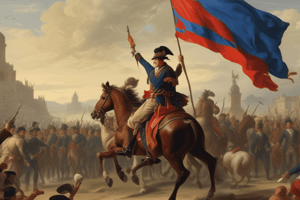Podcast
Questions and Answers
What was the main reason behind the French Revolution?
What was the main reason behind the French Revolution?
Which of the following was NOT one of the ideals of the French Revolution?
Which of the following was NOT one of the ideals of the French Revolution?
Who was the monarch who was executed during the French Revolution?
Who was the monarch who was executed during the French Revolution?
What was the name of the document adopted by the National Assembly in 1789?
What was the name of the document adopted by the National Assembly in 1789?
Signup and view all the answers
What was the significance of the Bastille?
What was the significance of the Bastille?
Signup and view all the answers
What was the primary source of income for the French monarchy in the 18th century?
What was the primary source of income for the French monarchy in the 18th century?
Signup and view all the answers
Which social class in France was exempt from paying taxes during the 18th century?
Which social class in France was exempt from paying taxes during the 18th century?
Signup and view all the answers
What was the name of the assembly that represented the common people in France during the late 18th century?
What was the name of the assembly that represented the common people in France during the late 18th century?
Signup and view all the answers
What was the outcome of the Tennis Court Oath in 1789?
What was the outcome of the Tennis Court Oath in 1789?
Signup and view all the answers
Which of the following was a consequence of the Reign of Terror during the French Revolution?
Which of the following was a consequence of the Reign of Terror during the French Revolution?
Signup and view all the answers
Study Notes
French Revolution
-
Causes of the French Revolution:
- Social Inequality: Estates System (Clergy, Nobility, Commoners) led to resentment among common people
- Financial crisis: National Debt, heavy taxation, and burden on common people
- Enlightenment ideas (Liberty, Equality, Fraternity) influenced people's thinking
- Weak Monarchy: King Louis XVI and Queen Marie Antoinette's unpopularity
Estates General and National Assembly
- Estates General: Representative assembly of three estates, first meeting since 1614, failed to address people's grievances
- National Assembly: Commoners' representatives formed a new assembly, declared themselves representatives of the people, and took an oath to create a constitution
Fall of the Bastille and the Great Fear
- Fall of the Bastille: July 14, 1789: Symbolic event marking the beginning of the French Revolution, prison stormed and governor killed
- The Great Fear: Peasants' uprising against nobility, destroying symbols of feudalism, and gaining control over their lives
Abolition of Feudalism and the Declaration of Rights of Man
- Abolition of Feudalism: August 4, 1789: National Assembly abolished feudal privileges, serfdom, and absolute monarchy
- Declaration of Rights of Man and Citizen: Fundamental document asserting equality, liberty, and democracy
Reign of Terror and Rise of Napoleon
- Reign of Terror: 1793-1794: Radical Jacobins, led by Robespierre, executed those deemed enemies of the revolution, causing widespread fear
- Rise of Napoleon: 1799: Napoleon Bonaparte seized power, ending the Revolution, and beginning a new era in French history
Studying That Suits You
Use AI to generate personalized quizzes and flashcards to suit your learning preferences.
Description
Test your understanding of the major events and key concepts of the French Revolution, a pivotal moment in world history, as studied in Class IX History.




